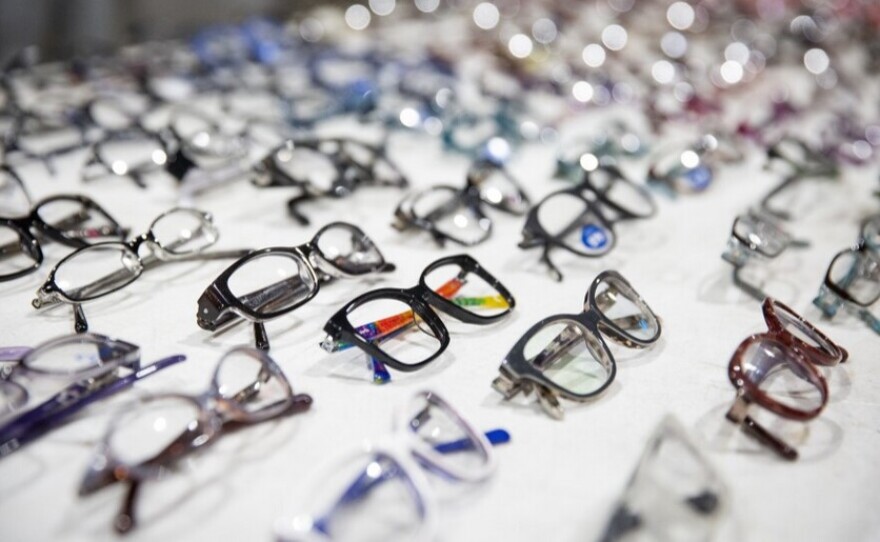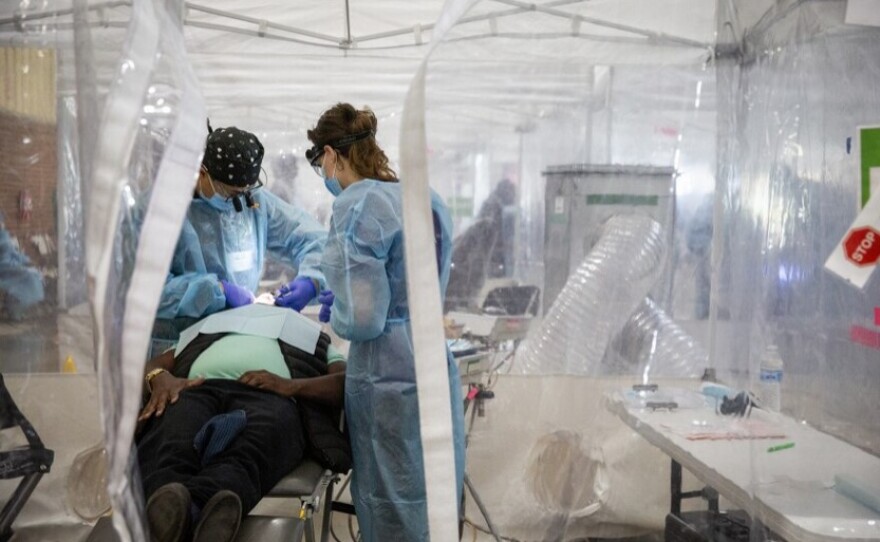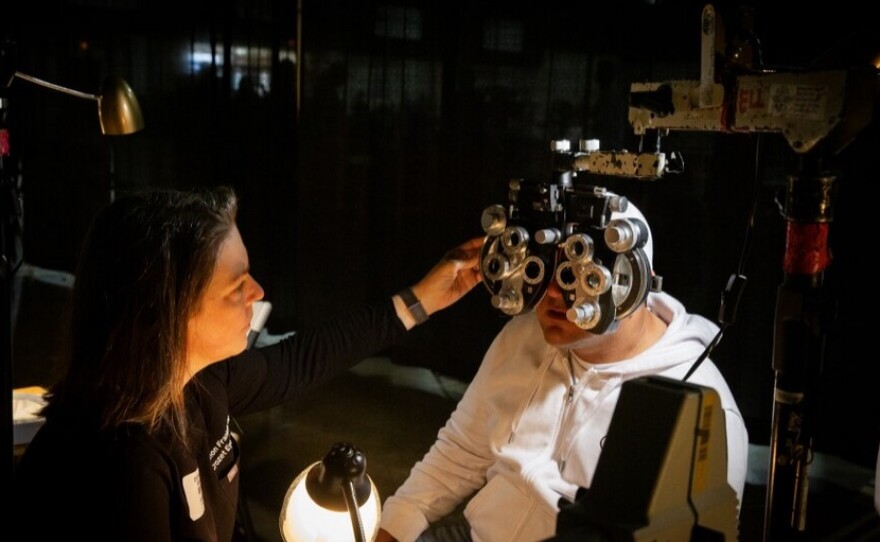Remote Area Medical provides essential care at a time of increased need.
Sitting in a dental exam chair in the Augusta County Expo Center last month, Sora Knightley explained her situation to Dr. Harold Neal.
“I had my back molar filled about two weeks ago,” Knightley said. “Well, after that — about two days after they told me I had cavities in the two teeth in front of it — now it's to the point I can't even bite down or even chew anything or drink water because it hurts so bad.”
“Does it wake you up at night hurting?” the dentist asked.
“Yes and just simply breathing. I mean, it feels like I have a bare nerve,” Knightley said.
The pain in three of her bottom-left molars started about four months earlier and gradually worsened. After months of enduring because of dental anxiety and fears about the cost, the insured 19-year-old went to a dentist. They filled the main cavity, but she said they told her that insurance wouldn’t cover addressing the problems in the other molars.
“It would have been around $2,300 just to get one tooth fixed,” she said. “So, I came here hopefully to either get an extraction or a tooth filled to get my tooth problem under control.”
Knightley was one of 402 people who visited Remote Area Medical’s Fishersville pop-up clinic that April weekend. The clinic offered free dental, vision and primary care, in addition to vaccinations, opioid reversal trainings and other services.
The group, also known as RAM, is made up of regional chapters. The organization was started in 1985 and rose to national prominence for putting on free clinics around the country.
While it has a relatively small national staff, the nonprofit mostly runs on the volunteer labor of doctors, dentists, nurses, medical students and others. Between its founding and 2023, RAM saw more than 200,000 volunteers provide care to nearly 1 million people.
The process
A lot of what RAM does depends on people waking up very early. If a clinic starts at 6 a.m. Saturday, like the one in Fishersville did, attendees often start showing up Friday night to claim spots.
Knightley showed up around midnight to become the 55th person in line for dental care. She, her boyfriend and two of their friends sat in the car watching Netflix on an iPad until they were called in, hours later.
At 4:30 a.m., Kim Faulkinbury arrived. The Louisa local ran the clinic and is one of six clinic coordinators employed by the group. An hour later, the volunteers had mostly arrived. At 6, the doors opened.
By about 8:10 a.m., all dental care slots for the day were taken.
Talking to WMRA/VPM News while eating her lunch at about 8:30 a.m., Faulkinbury said the clinic saw slightly higher demand than usual. But it was far from the most she’s seen.
“I had a clinic one time, where I'd given out all my tickets for the next day by 7 a.m. the previous day,” she said. “It just depends on how well known we are in an area — how many people come.”
After claiming a spot in line, attendees wait in their cars for a text saying it’s their turn to be seen. They walk into the venue, register and head to the triage station.
Audrey Stiles was one of the volunteers manning that station on Saturday. The Williamsburg-based, intensive care unit nurse arrived at 4 a.m. Her job was to tell patients what services were being offered, take down what they needed to have done and find out everything RAM needed to know to safely provide services.
“We ask them about allergies, medications, history, family history, and then we take their blood pressure and their pulse,” Stiles said. “And then — if they need to get blood sugar checked, if they have any diabetic history — we send them to the next table to get their blood sugars checked.”
Stiles said she saw high demand for dental and vision care, as well as many people with blood pressure or blood sugar issues. According to Stiles, those last two had been causing problems for people looking to get dental care. That's because before patients can get dental care, the clinic has to get their blood pressure and blood sugar to safe levels.
That was a big part of the care Melissa Reeves provided. The longtime nurse runs Augusta Health’s free mobile clinic and was at the RAM clinic providing primary care and connecting patients to follow-up services.
After patients leave triage, or after they get their blood pressure and blood sugar stabilized, they have access to all the care RAM provides. Reeves said many people then walked across the convention center to get dental care.
Along the way, patients had to pass Sofia Lopez — who stood just outside the designated dental wing of the convention center. Lopez, a third-year student at the University of Virginia School of Medicine, was standing there to catch anyone wanting a Spanish interpreter.
She said the work is essential to ensure everyone has access to care that meets their needs.
“If a patient doesn't have an interpreter, they're likely going to ask for less things, they're going to not tell their provider what's going on because they don't know how to communicate those things,” Lopez said. “On the other end, whenever their physician, nurse or dentist is asking them to do a treatment, or take a medication or asking them about symptoms, then they won't be able to do those things.”
Lopez said interpreting is especially important because of the area’s large population of recent immigrants from Latin American countries. In addition to being free, the clinic serves everyone — regardless of factors like immigration status and whether they have insurance.
Inside the dental wing, attendees waited to see Dr. Harold Neal. The triage dentist talked with the patients, checked their teeth and assessed their care needs. Afterward, they sat in one of three areas based on the service: tooth extractions, fillings and routine cleanings.
Dr. Keith Jackson helmed a tooth extraction tent.
Standing between the rows of tents while waiting for his next extraction, the oral surgeon said he was happy to see so many people getting cleanings.
“Preventive dentistry is always the best option if you can see your dentist,” he said. “If cavities can be caught early, they're usually very easy to fix. But if they're allowed to go on unchecked for years, at a certain point, taking out the tooth is the only option.”
Immense need and an imperfect system
Patients generally come to RAM because they have no other options.
Health care costs are increasing faster than wages and are at a near all-time high. That comes as benefits that were expanded early in the COVID-19 pandemic have been cut, causing record rises in poverty, according to the Census Bureau.
More than 20 million Americans have also lost Medicaid coverage since the federal government ended the policy of continuous enrollment about a year ago.
Within that landscape, RAM represents a rare safety net that doesn't come with strict eligibility guidelines, require mountains of paperwork or only serve U.S. citizens.
Federal insurance programs for vulnerable populations — Medicaid, Medicare and CHIP, as well as plans through the Affordable Care Act — do not permit undocumented residents to enroll. (Undocumented people with DACA status can now sign up for some ACA plans.)
Hospitals are notorious for making charity care — a key part of what allows nonprofit hospitals to be classified as nonprofits and not pay taxes — nearly impossible to access. Even many free clinics have restrictive thresholds for providing care.
And that’s when patients actually have nearby access to care. Many of the rural communities the organization serves are in health care deserts.
According to a report from health care consulting firm Chartis, 141 rural hospitals closed around the U.S. between 2010 and 2023. Two of those hospitals were in Virginia: Pioneer Community Hospital, of Patrick County (closed 2017), and Mountain View Regional Hospital in Wise County (closed 2020).
More than 3 in 4 Virginia counties and cities — mostly rural areas and home to 29% of the commonwealth’s population — meet the federal criteria to be designated as Health Professional Shortage Areas for primary care, according to a November 2023 analysis by the Virginia Mercury.
Five of Virginia’s counties and independent cities have no active doctor, WMRA/VPM News analysis of federal Health Resources & Services Administration data found. Another eight have less than one doctor per 5,000 residents and an additional 53 of those have less than one doctor per 1,000 residents.
While attendance at last month’s clinic was high, Faulkinbury said she hasn’t necessarily seen an increase in need.
“It's always been there; it's always gonna be there as far as I'm concerned. The people coming to the clinics are like the people coming to the clinics when I started,” she said. “The same people that don't have access to care for whatever reason, the vulnerable populations in our community.”
With more than 20 million Americans removed from Medicaid’s rolls, including more than 400,000 Virginians, that isn’t likely to change anytime soon.
————————-
A full schedule of RAM clinics can be found here. The next Shenandoah Valley clinic will be in Luray, Sept. 28 and 29.
People seeking free or low-cost care regardless of insurance status can also visit a local free clinic, Augusta Health’s mobile clinic or inquire about a local hospital’s charity care policy.
Find out how to sign up for Medicaid here.

















